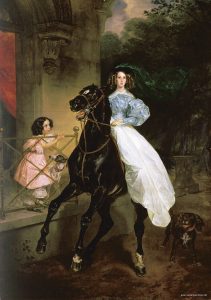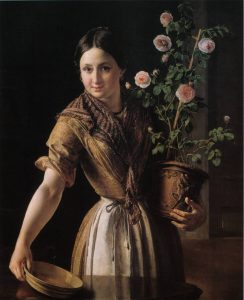Nikolai Gogol’s “Diary of a Madman” and Alexander Pushkin’s “The Queen of Spades” both feature protagonists who descend into madness while chasing such morally empty objectives as lust, respect, and fortune. Throughout the path to their eventual insanity and institutionalization for insanity, the symptoms of madness present themselves in a way that degrades the subjects. Madness is not a wild release for the protagonists in this story; it is much more of a reminder of the realities that Aksenty in “Diary of a Madman” and Hermann in “The Queen of Spades” are dissatisfied with. In fact, while Aksenty and Hermann lose their grip on reality through the distortion of insanity, their self-deception also reinforces their position in reality in cruel fashion .
Arksenty Ivanovich Poprischin is a social servant who aims to achieve power and dignity even though he greatly underachieves. He places the blame for this on his boss, the Section Chief, yet he also sees a path to liberation through the Section Chief’s daughter, Sophie. Arksenty falls in love with her, comparing her to a little bird with whom he could cast aside his personal insecurities. Arksenty’s madness eventually conceives of a dog who writes letters. Arksenty reads the letters, and they reveal Arksenty’s irrelevance to Sophie, her love with another man, and general insults about Arksenty’s appearance. If these letters are an invention of Arksenty’s crazed mind, why do they further degrade him? Even if the letters had been real, his madness now supplies an innocent, objective figure (Madgie the dog) to deliver insults to Aksenty. Either way, the letters seem to reinforce his position of irrelevance which he hopes to transcend. In this way, Arksenty’s madness misleads his ultimate goals by delegitimizing them.
In Pushkin’s “The Queen of Spades,” Hermann also misleads himself in the midst of his obsession with discovering the secret of the card game fero. Hermann feigns love for Lizaveta in order to chase an empty and corrupt wealth. He wants to gain access to the countess’ secrets that were born out of necessity and gifted to the countess only to alleviate her from poverty. After his armed appearance shocks the countess to death, Hermann’s mad consciousness punishes Hermann for his shallowness; the wink of the countess’ corpse and her appearance as a ghost to reveal the card game secret only pit Hermann against himself. He misleads himself into thinking that he possesses a secret, and then through this arrogance he loses his final card game and goes insane.
Madness, through all of its distortions, imprisons the protagonists in their own sad realities in these stories. This raises some questions: Is this punishment for their moral shallowness? If so, why is such a punishment self-inflicted, and what does it say about the way Russian society viewed insanity?


